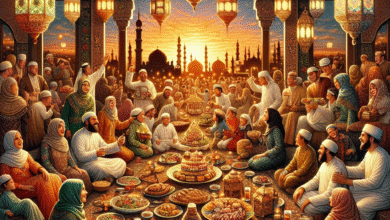Introduction
Ramadan is a significant religious observance for Muslims around the world, characterized by fasting, prayer, reflection, and community. This month-long period is dedicated to spiritual growth and self-discipline, culminating in the celebration of Eid al-Fitr.
Religion
Ramadan is celebrated by followers of Islam, the second-largest religion in the world. It is one of the Five Pillars of Islam, which are the fundamental acts of worship that define a Muslim’s faith and practice.
Countries and Regions of Celebration
Ramadan is primarily celebrated in predominantly Muslim countries and communities, including:
- Saudi Arabia: Home to the two holiest cities in Islam, Makkah (Mecca) and Madinah (Medina), Saudi Arabia observes Ramadan with great reverence.
- Indonesia: The country with the largest Muslim population, Indonesia has vibrant Ramadan traditions, including communal prayers and iftar meals.
- Turkey: Known as "Ramazan," this month is filled with unique cultural practices and community activities to enhance spiritual devotion.
- Egypt: Ramadan in Egypt is marked by traditional foods and festivities, including lantern lighting and nightly events.
- Pakistan: Observed with fervor, Pakistan sees communal prayers, fasting, and the spirit of charity prominently during Ramadan.
Historical Background
The historical origins of Ramadan trace back to the 7th century when the Quran was revealed to the Prophet Muhammad during this sacred month. According to Islamic tradition, the first revelation occurred on the Night of Decree (Laylat al-Qadr), believed to fall within the last ten nights of Ramadan. Fasting during this month was established as a religious obligation in the second year after the Hijra (migration) to Medina.
Cultural and Religious Significance
Ramadan holds profound spiritual significance for Muslims, as it emphasizes self-control, humility, and empathy for the less fortunate. Fasting (sawm) during this month is seen not only as an act of worship but also as a means to achieve closeness to Allah (God). It fosters a sense of community among Muslims, reinforcing the importance of charity (zakat) and generosity during this reflective period.
Traditions, Practices, and Symbols
Typical practices during Ramadan include:
- Fasting: From dawn (Fajr) until sunset (Maghrib), Muslims abstain from food, drink, smoking, and marital relations.
- Iftar: The meal that breaks the fast at sunset, often beginning with dates and water, followed by larger meals shared with family and friends.
- Suhoor: A pre-dawn meal that provides nourishment for the day of fasting ahead.
- Tarawih: Special prayers performed in congregation at night after the obligatory prayers.
- Quran Recitation: Many Muslims aim to complete the recitation of the Quran during Ramadan, reflecting on its teachings.
Symbolic elements such as the crescent moon represent the start of Ramadan, while the lantern (fawanees) is a traditional symbol of celebration.
Time of Year
Ramadan is celebrated during the ninth month of the Islamic lunar calendar, known as the Hijri calendar, which is about 10-12 days shorter than the Gregorian calendar. This means that the observance of Ramadan shifts each year.
Typical Dates
Since the Islamic calendar is lunar, the dates of Ramadan change annually. For example, in 2023, Ramadan is expected to begin around March 23 and end around April 21, with the precise start depending on the sighting of the moon. The variability of dates each year reflects the lunar cycle and cultural interpretations of moon sighting.
Fun Facts
- Eid al-Fitr: Ramadan concludes with Eid al-Fitr, a festive holiday celebrated with communal prayers, feasting, and giving of zakat al-fitr (charitable donations).
- Global Celebrations: While fasting is a common practice, local customs and celebrations add unique flavors to the month, with distinct foods, decorations, and events.
- Historical Roots: The first recorded fasting of Ramadan by Muslims occurred in the year 624 CE, marking the observance’s historical depth in Islamic practices.
- Health Benefits: Fasting during Ramadan is believed to offer potential health benefits, such as improved metabolic health and mental well-being, though it requires careful management to ensure that individuals remain healthy.
Ramadan is a month marked by profound spirituality, cultural richness, and a strong sense of community and belonging, highlighting the essence of Islamic faith and practice around the globe.




